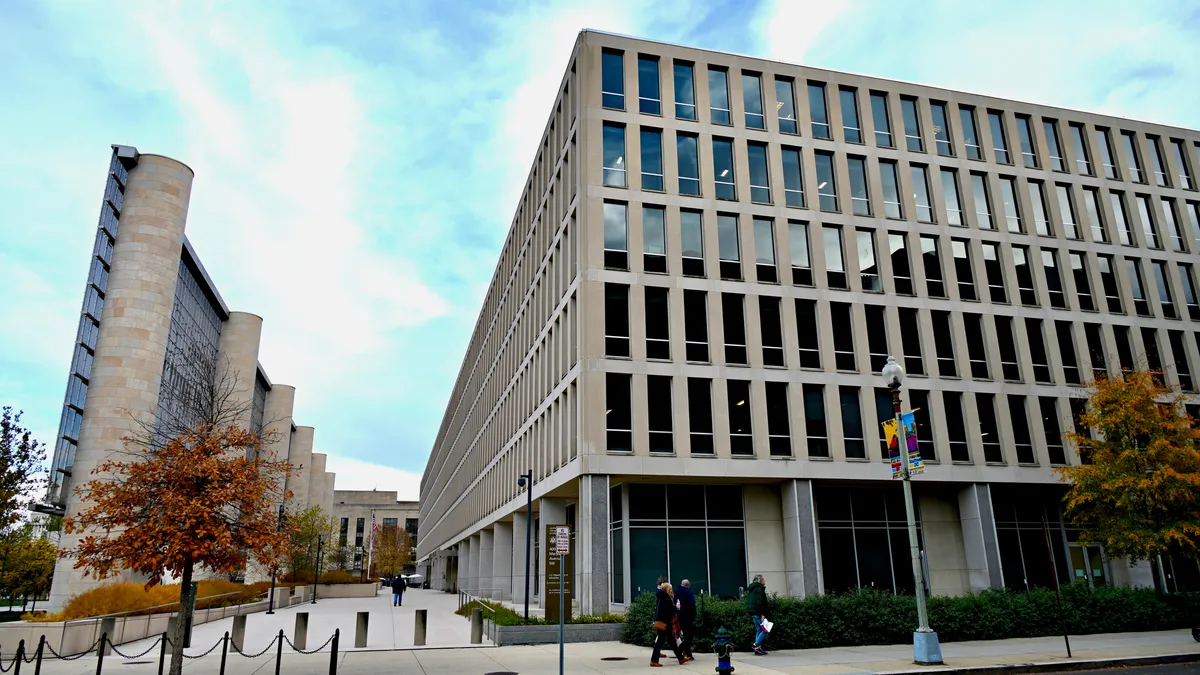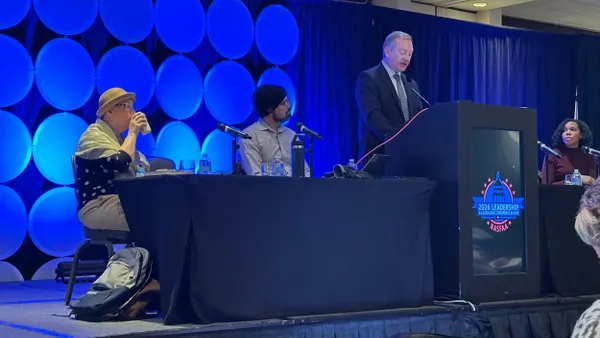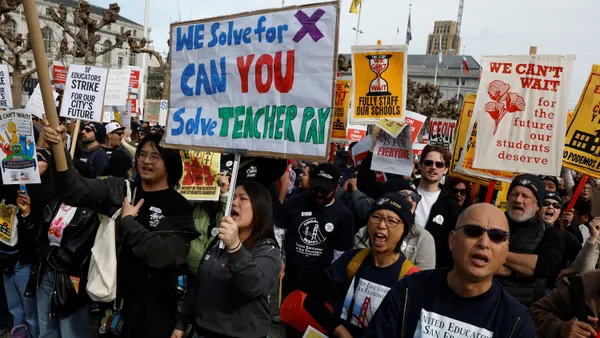Dive Brief:
- A federal judge has ordered the U.S. Education Department to reinstate all laid-off Office for Civil Rights employees for now, saying the layoffs and shuttering of seven regional offices had rendered the remaining staff "incapable of addressing the vast majority of OCR complaints."
- The closed offices had employed 208 investigators, or 55% of the agency's total investigative staff. Caseloads for the remaining investigators have doubled since the mass Education Department layoffs in March, according to the court ruling.
- The department notified the OCR employees currently on administrative leave about the temporary block on Friday, but said in its email that it intends to appeal the order.
Dive Insight:
Plaintiffs in the case, Victim Rights Law Center v. U.S. Department of Education, have shown that no new investigations have been opened since President Donald Trump’s inauguration "and that existing complaints have been paused almost entirely," U.S. District Judge Myong Joun wrote in the June 18 order granting a preliminary injunction to temporarily restore OCR to its status quo.
"This is enough to indicate that due to the RIF’s mass terminations and closure of multiple OCR’s offices, that OCR has abdicated its enforcement duties," Joun said.
The case, which seeks to restore OCR to its previous capacity, was filed by parents of elementary school students from Michigan and Nebraska alleging disability and race-based discrimination and harassment, alongside the Victim Rights Law Center, a nonprofit representing victims of sex-based harassment and students in OCR investigations.
According to OCR's open cases database, which has not been updated since Trump took office in January, more than 12,000 open civil rights investigations remain on the books. The seven regional offices that closed were in charge of investigating more than half — or 6,850 — of those cases. Five regional OCR offices remain open.
The Biden administration had cited OCR's rising caseload as a reason to increase its budget and investigative staff. Catherine Lhamon, who led OCR under the Biden and Obama administrations, in 2023 called its caseload, which averaged up to 48 cases per investigator, "untenable" and "worrisome."
Now, following the reductions in force, that caseload has more than doubled to an average of 115 cases per staff member.
While the RIF has left OCR "with the capacity to address only a small fraction of the complaints that it receives, making it impossible for OCR to comply with its statutory and regulatory obligations," these issues began before then, in January 2025, according to Joun's order.
Since January, even prior to the RIFs, the department has for the most part ignored thousands of pending complaints unless they involved alleged discrimination impacting White and Asian students, according to Joun. After its pause on investigating other complaints, it then resumed investigations related to students with disabilities, according to court documents.
OCR instructed staff to not only freeze all investigations of complaints filed by the public, but also “to not communicate with students, families, and schools involved in their cases and to cancel scheduled meetings and mediations," per last week's order.
The office also told staff not to use typical investigation processes, including requesting documents, conducting interviews, participating in meetings or mediations, negotiating resolution agreements with schools and districts, and issuing letters of findings in cases, the case documents added.
As a result of the RIFs, investigators cannot visit schools in person to gather critical facts as they used to, "making it impossible for OCR to complete investigations and cases promptly and fairly," Joun said.
Joun, a Biden-appointed federal judge for the U.S. District Court for Massachusetts, late last month issued a temporary block in New York v. McMahon, requiring the Education Department to keep all of its laid-off staff employed rather than terminating them by the department's stated June 9 deadline.
The department appealed that decision to the U.S. Supreme Court, asking the justices to allow its RIFs to go through. At the same time, to comply with the court order, the agency has sent emails to laid-off employees that the agency was “actively assessing how to reintegrate you back to the office in the most seamless way possible.” The Supreme Court has not yet ruled in the case.
In that case, Joun, however, said the department's RIF left it "without enough employees to perform statutorily mandated functions," adding that, “This court cannot be asked to cover its eyes while the Department’s employees are continuously fired and units are transferred out until the Department becomes a shell of itself.”
Joun struck a similar tone in his ruling on the OCR situation. He called the civil rights office “an essential bulwark against unlawful discrimination in the American education system" that was compromised by the RIFs.
The judge instructed the department "to restore the OCR to the status quo such that it is able to carry out its statutory functions" and to continue investigation of all complaints, including those related to race, sex and disability.
As in New York v. McMahon, the department is required to file weekly updates with the court on the progress it has made to restore OCR to its status quo.






 Dive Awards
Dive Awards









